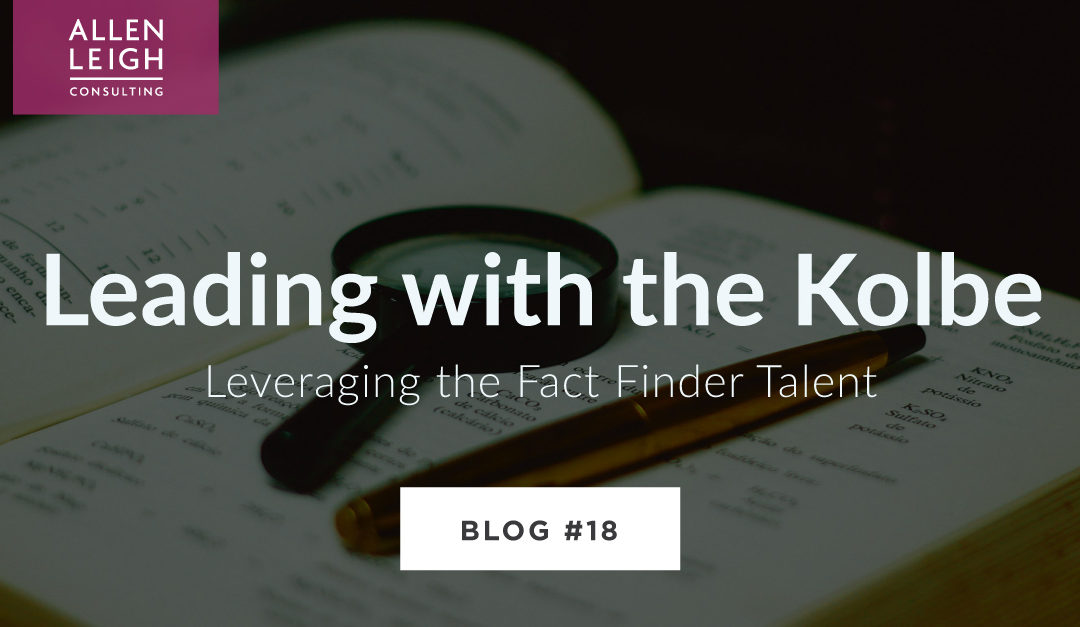Leveraging the Fact Finder Talent
Are you leading someone who approaches work differently than you? Maybe you love the details and expect accuracy, yet whenever you receive a final document from a direct report there are multiple font sizes and errors.
If you are a high Fact Finder leader – aka love the details – you have a natural talent for seeing the details. If you were Google earth, you would be the street level view. When solving new problems, you prefer the background before jumping into action. When coaching Fact Finders, I often joke that when new to a role they can expect it to take about 6 months to be really comfortable and that they will want to quit at least 3 times! High Fact Finders are natural specialists and feel best when they are in their rhythm and in the know.
In workshops, high Fact Finders are the individuals who google the Kolbe in advance, review my LinkedIn page and try to do a pretest before proceeding with the questionnaire. A manager once called me and asked if one of his managers could retake the Kolbe as he feels like he completed it wrong. I informed that I would love “Joe” to retake the assessment, but first let’s wait for the workshop. He asked how I knew it was Joe – I smiled – it’s always Joe, he was a 9 Fact Finder.
When sending emails, Fact Finders have to reflect on whether they are actually communicating or just data dumping. I once was driving up North for a family camping trip when I called our 10 Fact Finder friend to ask for directions. I should also mention that a day earlier he sent along an 8-page email for all of us to review – I did not. Nor did the other two 8 Fact Finders in the car. When I called him, I poked the bear – he felt disrespected and used. How dare I not read the email. Did I know how long it took him to write it?
Both of us had something to learn from this situation. For my 10 Fact Finder friend, he had to realize that his 8-page email was not really for me but for him. He felt comfort in writing out all the details of the trip. When communicating, Fact Finders benefit from structuring their emails so as not to just data dump but provider direction on what they want the recipient to do with the data.
Remember that Kolbe only kicks in when you are interested in a topic or under pressure. If a colleague is not particularly interested in your facts, then you can expect to observe a glazed over look when you have overwhelmed them with too much data. When you see this, try to catch yourself and ask what details they would be interested in? Don’t guess.
Delegation can also be tricky for Fact Finders. High Fact Finder leaders although keen on the details don’t always articulate their expectations super well. I have observed this when leaders try to delegate through Telepathy. This is when they expect a colleague to read their mind! Similarly, when receiving delegation, a high Fact Finder without specific expectations can be left paralyzed as there are too many options to explore and they aren’t quite clear as to the best next steps. The danger of unclear delegation, in this case, is too much wasted time on unnecessary details or tasks that aren’t relevant to the expectations at hand. A great tool to assist Fact Finders in delegation is Allen Leigh’s Delegation Tool, which gets both the leader and direct report on the same page.
In teams, high Fact Finder preferences ensure accuracy and perfection. When too many Fact Finders are in a room or there aren’t enough details then analysis paralysis can take place. These teams also love having lots of discussion and not necessarily landing the plane. I once watched a senior team in an executive offsite and after the session, the CEO commented on how many important decisions were made. I had to laugh, actually, the team never made one decision in the 3-hour session, just a lot of discussion.
To balance the strength of the Fact Finder team, a decision making team tool such as Fist-to-Five is helpful to keep conversations on track. If you notice that your team spends too much time discussing and not enough time coming to a decision, this process will help move conversations forward.
Whether you are a Fact Finder or lead Fact Finders, celebrate the talent that these colleagues bring to the table. They keep us out of trouble by demanding the necessary research before taking risks! And it is for this that I love my Fact Finder friends.




